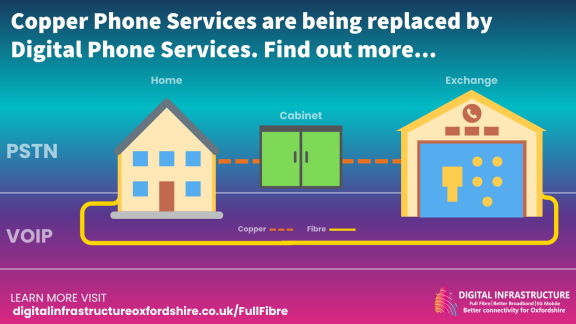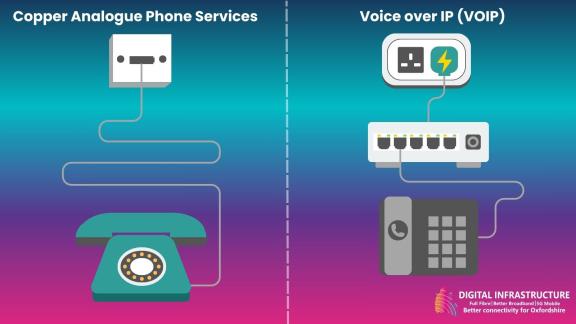Public Switched Telephone Network (PSTN) Switch Off
What is it?
Landline phone services in our country have relied on copper wires and analogue signals for over a century.
Over time the copper phone network has degraded and is no longer as efficient as it could be. Also, replacement parts are hard to find and this means keeping the service running becomes increasingly difficult.
As a result, the copper analogue phone network in the UK is being retired by the end of 2025.
This means that all landline services within the UK will need to be upgraded to a digital Voice (VOIP) service before this date.

Why does it matter?
- This affects every landline in the UK.
- The rollout of digital voice services (VOIP) is already underway by ISPs in some areas.
- Devices connected to the phone line need to be compatible with digital voice services (VOIP).
- Digital voice services (VOIP) require power to the modem to function. In the event of a power cut, services will be unavailable without a battery backup.
How are Digital Voice Services different to Copper Analogue Services?
- Copper Analogue Phones connect directly from the phone into a wall socket or may use a splitter which is then connected to a socket in the wall.
- Digital Voice Services (VOIP) connect directly into the Broadband Router.

Who will be affected?
- Anyone with a landline in the UK will be affected.
- This doesn’t just impact phone calls. Any devices that connect to your existing phone line such as alarms, door entry systems, CCTV and payment devices (EPOS) will be impacted by this change.
What do you need to do?
- The Communications Provider that supplies your phone line services will contact to their customers ahead of the planned switch over date.
- If you have any concerns, you can contact your phone line supplier at any time, to ask what their plans are for your phone line.
- If you do not have a broadband service contact your phone supplier to find out what their plans are for you. Digital voice services (VOIP) require a broadband connection.
- You need to check whether your existing devices are VOIP compatible. You should be able to check this on your VOIP supplier’s website.
- Anyone who wishes to keep their existing phone number must apply to transfer (port) their number to their chosen VoIP Provider before ceasing their existing voice service.
- If you have friends or relatives who rely on their landline services, please speak to them about PSTN switchover and what they need to do.

What are the benefits of Digital Voice (VOIP) services?
- Improved sound quality: Modern VOIP Calls have come a long way from the early days and sound clearer with limited dropouts, tinny voices or delays. The better your internet connection, the higher your call quality.
- Better Reliability: Digital services run across multiple data centres. If one goes down, traffic switches seamlessly to another and your service carries on regardless providing better reliability.
- Keep your current number: If you speak to your VOIP provider before switching over, you can transfer (port) your number.
- Cost saving is one of the major reasons many homes and businesses are already using a digital phone service. With VOIP services you are only paying for the service, rather than installation, operation, and maintenance of traditional copper landline services.
Links with further information about PSTN Withdrawal:
UK Transition from analogue to digital landlines
Upgrading the UK to digital phone lines - Openreach
Stop Sell updates for Analogue Phone Services - Openreach
